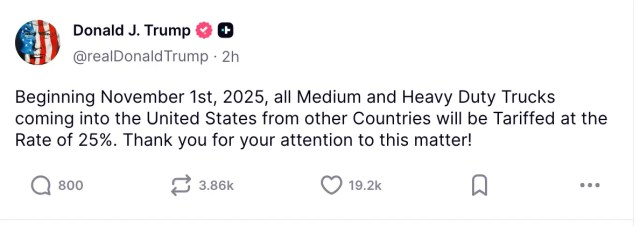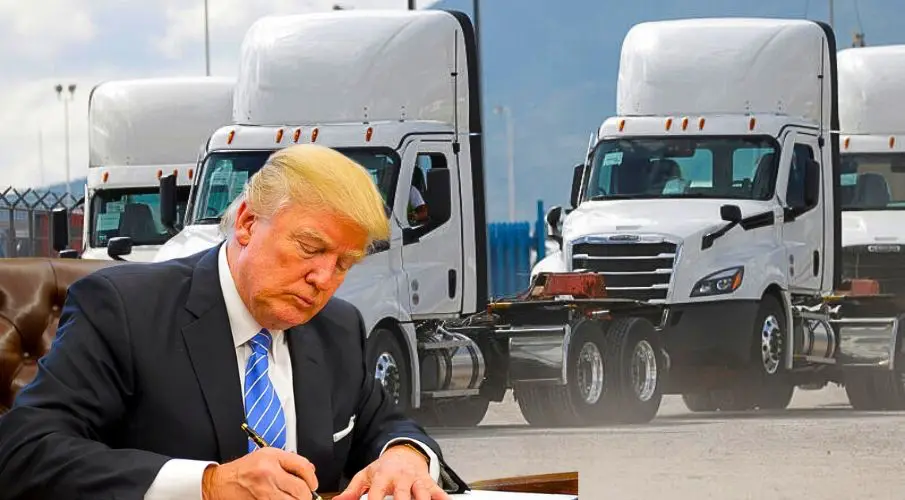Donald Trump has once again postponed his latest round of tariffs - this time the announced 25 percent on medium and heavy-duty trucks. The import duties were actually supposed to take effect on October 1, together with the punitive tariffs on pharmaceuticals (100 percent), kitchen furniture (50 percent), and upholstered furniture (30 percent). But the president, who sees tariffs as both a tool and campaign rhetoric, unexpectedly backtracked on Monday. On his platform Truth Social, he declared that the duties would now apply starting November 1. He gave no reasons. The White House initially remained silent about the delay - a pattern that has been repeating for weeks. While official spokespeople remain mute, the interpretation of the decision is left entirely to the president himself. He stages the tariffs as a patriotic shield, a declaration of war against "foreign manipulators" who allegedly undermine America’s industry. But the reality is far less heroic. Behind the delay lies obvious nervousness - economic as well as political.

The truck tariff does not particularly hit China or Mexico, but primarily U.S. companies that rely on international supply chains. Manufacturers such as Navistar, PACCAR, or Daimler Truck North America import chassis, engines, and components from Canada, Germany, and Japan. A 25 percent levy would cause their costs to explode immediately - and further increase prices for freight companies, construction firms, and logistics providers. Many transportation companies are already complaining about rising spare part prices and shrinking margins due to earlier tariff packages. That Trump is now postponing the introduction precisely on the eve of Canadian Prime Minister Mark Carney’s visit to November 1 is likely no coincidence. Carney has repeatedly criticized Washington’s protectionist trade policy and pointed out that Canadian suppliers secure tens of thousands of jobs in the U.S. An escalation immediately before the meeting would have led Trump’s administration into a diplomatic dead end.
But the postponement does not solve the problem - it merely shifts it. Economists warn that the combined effect of the new punitive tariffs - especially the 100 percent on pharmaceuticals - could rekindle inflation in the coming months. As early as August, consumer price inflation had reached 5.6 percent, driven by import costs and supply bottlenecks. While the White House calls the measures a "strategic adjustment," analysts speak of a course without a compass: an economic policy that prioritizes short-term headlines over long-term stability. The political motivation is transparent. Trump needs visible enemies and economic theater pieces to demonstrate strength. His tariffs are less economic instruments than symbolic boundary markers - an attempt to stage control over a system that is already globally interwoven. But as in his first term, it is ultimately not China or Europe that bears the main burden, but American consumers, small businesses, and farmers.
The late postponement by one month is therefore more than an administrative act - it is a symptom. A sign that Trump’s economic policy oscillates between wish and reality, between loudness and emptiness. While he strikes the tone of the unshakable leader on Truth Social, his decisions appear increasingly erratic, reactive, and ill-conceived. That the president is putting his own industry under pressure with import tariffs in the election year 2026, while supply chains are already strained, could prove to be a political boomerang. Criticism is already growing in the manufacturing states of the Midwest - where Trump’s base was once particularly strong. "We’re paying the price for his headlines," said a hauler from Indiana, "and he sells it as patriotism."
The truck tariff may not take effect until November. But the damage - economic as well as political - has long been done. Trump’s economic policy resembles more than ever a game on the edge of the abyss: loud, unpredictable, and with each round more dangerous for those who have to pay for it.
Investigative journalism requires courage, conviction – and your support.
Please also strengthen our journalistic fight against right-wing populism and human rights violations. We do not want to finance ourselves through a paywall so that everyone can read our research – regardless of income or origin. Thank you very much!


wann hat dieser Schwachkopf jemals eine bedachte Entscheidung getroffen???🤮Heute Hü, morgen hott.
Ich die Welt, wie sie mir gefällt. Selbst Pippi Langstrumpf hat mit mehr Verstand agiert, als Trump.
Deals mit ihm sind eigentlich wertlos.
Denn unabhängig davon fällt ihm immer was Neues ein um ehemalige Verbündete zu brüskieren.
Zölle sind da sein Lieblingsspielzeug.
Trotz „EU Deal“ kommt er mit immer neuen Zöllen um die Ecke.
Italien soll eine extra Steuer auf Nudeln zahlen.
Mal sehen, was dem Irren als nächstes in den Sinn kommt